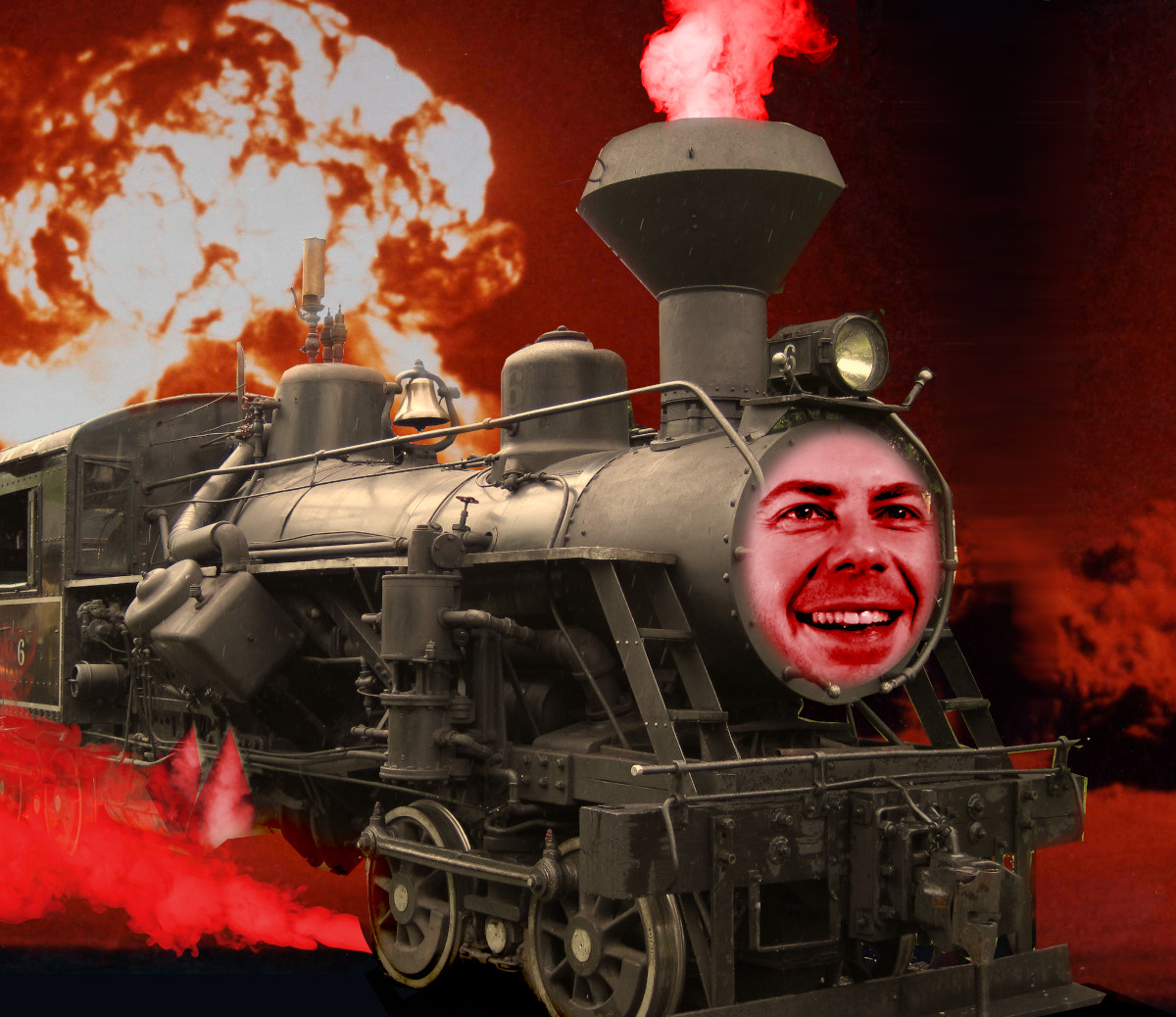
When a #FreightTrain carrying toxic chemicals derailed near #EastPalestine, #Ohio, bursting into flame and sending up clouds of poisonous vinyl chloride smoke and gas, our immediate concerns were for the people in harm's way and the train's crew:
nytimes.com/2023/02/04/us/… 1/
nytimes.com/2023/02/04/us/… 1/

If you'd like an essay-formatted version of this thread to read or share, here's a link to it on pluralistic.net, my surveillance-free, ad-free, tracker-free blog:
pluralistic.net/2023/02/11/din… 2/
pluralistic.net/2023/02/11/din… 2/
Those immediate concerns were soon joined by broader worries: that the entire rail industry presented a systematic danger, and the Ohio #derailment was a symptom of a much deeper pathology that endangered anyone who lives near one of the rail corridors that crisscross the US. 3/
The rail industry is the poster child for corporate power, and rail barons were among the first targets of Gilded Age #trustbusters who saw rail #monopolies as a threat to the prosperity and wellbeing of Americans, as well as the integrity of the American political system. 4/
40 years of #neoliberal #ConsumerWelfare #antitrust - starting with Reagan and continuing through every administration since - has seen the American rail sector achieve levels of concentration that meet and exceed the corrupt, untenable degree of the late 19th century. 5/
Like the first rail barons, the current crop (including the self-styled cuddly billionaire #WarrenBuffett) gutted investment, skirted safety, maimed their workforce, smashed their unions, and reduced the US #SupplyChain to a state of brittle precarity:
pluralistic.net/2022/02/04/up-… 6/
pluralistic.net/2022/02/04/up-… 6/
Like all monopolists, the rail industry has been able to capture its regulators, trampling evidence-based policy and replacing it with rules that benefit shareholders at the expense of the public, labor, and customers.
doctorow.medium.com/regulatory-cap… 7/
doctorow.medium.com/regulatory-cap… 7/
This #RegulatoryCapture is an inevitable consequence of market concentration. When an industry is composed of dozens of small- and medium-sized firms, they are unable to converge on a single story about which rules regulators should favor them with. 8/
Some of those companies will want things the others don't, and each will vie to produce evidence disconfirming the others' claims. 9/
But when an industry dwindles to a handful of cozy giants, their C-suites are stuffed with company-hopping executives who've done time at every major company in the sector. 10/
That lets them converge on a single fairy tale about the best way to regulate their industry, and convert their regulators' truth-seeking exercises into rigged auctions that they handily win:
locusmag.com/2022/03/cory-d… 11/
locusmag.com/2022/03/cory-d… 11/
That's what happened during the #Trump years, when rail lobbyists secured the repeal of a long-overdue, hard-won safety regulation. 12/
That rule would have required rail companies to replace the Civil-War-era brakes on their rolling stock with modern #ElectronicallyControlledPneumaticBrakes (#ECP):
jacobin.com/2023/02/rail-c… 13/
jacobin.com/2023/02/rail-c… 13/
The repeal cost millions in lobbying dollars, but it was worth it. Shortly after the ECP rule was scrapped, #NorfolkSouthern handed millions in bonuses to its execs and did billions in #StockBuybacks, while laying offf thousands of workers:
fool.com/investing/2018… 14/
fool.com/investing/2018… 14/
Elections, we're told, have consequences. After Biden won the 2020 presidential election, he made a string of excellent appointments. 15/
I'm thinking of people like @FTC chair @linakhanFTC, who hit the ground running with detailed plans for sweeping, consequential changes to would blunt corporate power, reverse-Trump era abuses, and address the dysfunctions that made Trump possible:
eff.org/deeplinks/2021… 16/
eff.org/deeplinks/2021… 16/
But other Biden appointees arrive in office with much less ambition. Transportation Secretary @PeteButtigieg has spent his tenure as King Log, failing to take action on spiraling airline cancellations. 17/
He confined his major enforcement action to fining foreign airlines while ignoring the out-of-control abuses of America's domestic carriers, except for the also-ran airline Frontier, which accounts for less than 2% of domestic travel:
pluralistic.net/2023/01/16/for… 18/
pluralistic.net/2023/01/16/for… 18/
There are striking similarities between the structural defects in the airlines and the rail companies. 19/
Both are highly concentrated sectors who have laid off senior staff, attacked unions, and blown billions in public money on stock buybacks and executive bonuses, even as their service degraded. 20/
Both industries have been sharply criticized by experts and industry veterans, who've called for specific regulation. In the case of the airlines, SWA pilots and flight attendants had sounded the alarm about antiquated scheduling systems. 21/
For the rail companies, it's experts like Grady Cothen, formerly a top safety expert at the #FederalRailroadAdministration (#FRA). 22/
He told Congress that without action on braking systems, "[there] will be more derailments, more releases of hazardous materials, more communities impacted":
congress.gov/event/117th-co… 23/
congress.gov/event/117th-co… 23/
Despite these warnings, and despite the near-misses and smaller disasters that led up to the 100-foot-tall fireball over Ohio, Buttigieg's DOT has not moved to reinstate the Obama-era brake safety rule. 24/
Instead, they deferred to the monopoly rail owners self-serving claim that there is no need for such a move:
jacobin.com/2023/02/depart… 25/
jacobin.com/2023/02/depart… 25/
Indeed, the FRA is currently considering a rule that would *further weaken* braking rules, reducing obligations to inspect, test and certify braking systems:
regulations.gov/document/FRA-2… 26/
regulations.gov/document/FRA-2… 26/
The rail labor unions - the best source of independent expertise on the daily operation of the freight system - say that this would be a disaster. 27/
"Following through with a final rule would only deliver yet another financial windfall to rail carriers by eliminating inspections, testing and repairs, and deferring routine maintenance":
goiam.org/news/territori… 28/
goiam.org/news/territori… 28/
Serving as Transportation Secretary to the President of the United States of America makes you one of the most powerful people in the history of the human race. The Secretary's powers, while not unlimited, are extensive. 29/
The American people need a DoT that works for them, not one that weakens safety rules:
pluralistic.net/2023/01/10/the… 30/
pluralistic.net/2023/01/10/the… 30/
Image:
Gage Skidmore (modified)
commons.wikimedia.org/wiki/File:Pete…
CC BY-SA 2.0
creativecommons.org/licenses/by-sa…
James St John (modified)
flickr.com/photos/jsjgeol…
CC BY 2.0
creativecommons.org/licenses/by/2.… 31/
Gage Skidmore (modified)
commons.wikimedia.org/wiki/File:Pete…
CC BY-SA 2.0
creativecommons.org/licenses/by-sa…
James St John (modified)
flickr.com/photos/jsjgeol…
CC BY 2.0
creativecommons.org/licenses/by/2.… 31/
• • •
Missing some Tweet in this thread? You can try to
force a refresh














